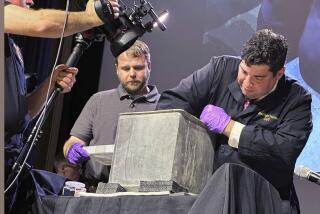A Worldwide Rush to Put Time in a Bottle : Families and communities are closing out the century by gathering mementos in time capsules. Participants enjoy the chance to ‘write yourself into history.’
- Share via
ATLANTA — The 21st century is breathing down our necks. So as the 1990s wind down, people are gathering up personal mementos and stuffing them into time capsules--containers of all sizes and varieties, from garbage bags sealed with duct tape to fancy cases buried in heavy vaults.
Families, schools and communities are storing away bits of history to be opened 50, 100 or even thousands of years from now. “Time capsules, especially with the millennium, are catching on worldwide,” says Paul Hudson, founding member of the International Time Capsule Society at Atlanta’s Oglethorpe University. He advises the public on how to organize a capsule, and maintains the society’s capsule registry.
“Everybody loves them,” Hudson explains. “If you want to write yourself into history, you get this feeling that you’re doing it.”
Oglethorpe University is an appropriate headquarters for the society, established in 1990. The university is home to the Crypt of Civilization, a massive vault filled with thousands of 20th-century artifacts that was sealed in 1940--with a projected opening date of May 28, 8113.
*
More than 1,400 capsules are registered on the society’s database--the goal being to list all existing capsules so that future generations will know their whereabouts. Thousands have been lost over the years because they were not adequately marked.
“There’s tremendous excitement when you’re getting the capsule together, organizing it, sealing it or burying it,” Hudson says. “What I like to emphasize is to treat it like it is a person. Don’t forget about it.”
Abby Conley, who chairs the Greater Erie (Pa.) Bicentennial Time Capsule project, developed a plan to ensure that when that capsule is opened in 2095, people in Erie will be present to celebrate. A contest was promoted requesting suggestions on the kinds of things that should be preserved.
As each item was accepted for deposit in the vault, Conley marked it with a number. The contributor received a deed, with a matching docket number, to be passed down to future generations. When the capsule is opened, the deed holder can retrieve the object stored away by his or her ancestor.
The Erie capsule, says Conley, is “a snapshot of our community” and includes items such as a regional telephone directory, Gov. Thomas J. Ridge’s inauguration speech, a videotape of Holocaust victims who live in the area, cash-register receipts and an alphabet book written by third-grade students.
New parents are filling time capsules destined to be opened on their child’s 18th or 21st birthday. The containers are sold with suggestions of hundreds of things that can be packed inside--newspapers, stamps, coins, photographs, a lock of hair, a family tree. The label imprinted “Do Not Open Until . . . “ is included.
In Boca Raton, Fla., home designer Albert Jackman offers nontraditional time capsules to his clients. His version is fashioned from ordinary PVC pipe that is buried vertically in the foundation of the home. A metal plate placed in the home’s floor marks the site. Of the 10 families who have included time capsules in their homes, Jackman says: “They all love it. It’s like the old thing of when you used to put your handprints in concrete and write the date. But this is so much more. . . . It has our thoughts, our ideas.”
*
In Tempe, Ariz., in the year 2021, a steel box will give up 125 items--including Super Bowl XXX souvenirs, figurines from “The Hunchback of Notre Dame” and a letter from city officials asking if their visions of the new millennium have come true.
In Myrtle Beach, S.C., in 2095, from the Hard Rock Cafe, a 6-foot-tall sarcophagus will be lifted from its glass case and opened. Inside is an entertainment treasure trove--including an Elvis Presley music box that plays “Love Me Tender” and a brick from the Cavern Club in Liverpool, England, where the Beatles were discovered.
“You’re kind of defining yourself when you put something in,” says Hudson. “I wish I had done one as a child and opened it later. I would have put my baseball cards inside.”
More to Read
Sign up for The Wild
We’ll help you find the best places to hike, bike and run, as well as the perfect silent spots for meditation and yoga.
You may occasionally receive promotional content from the Los Angeles Times.






